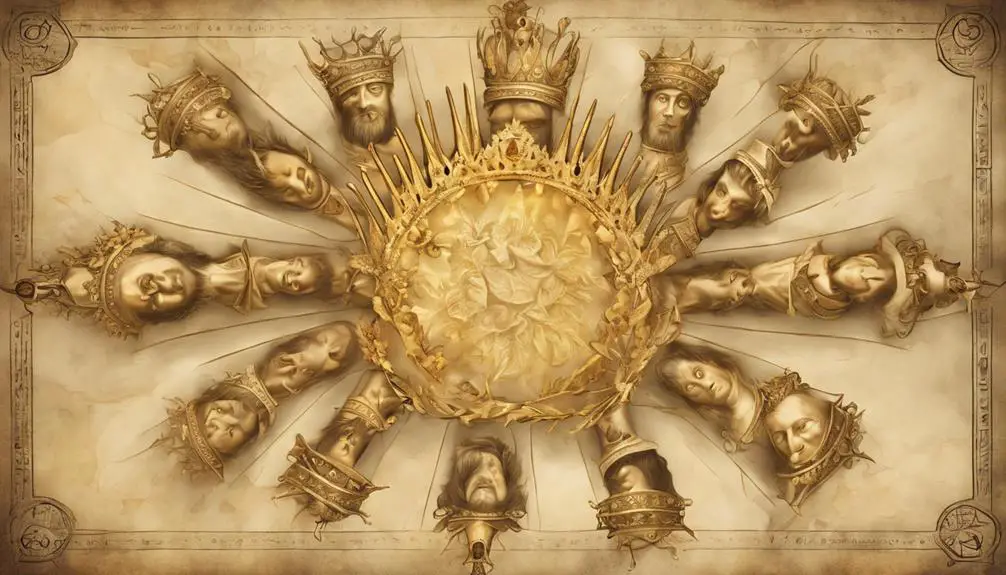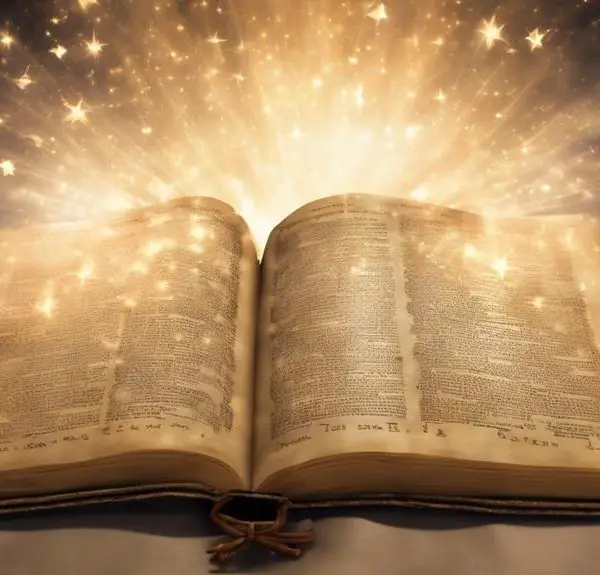Navigate the symbolic depth of number 24 in the Bible, uncovering its divine significance in governance, worship, and celestial order.

What Does 24 Mean in the Bible
In the realm of the mundane, 24 signifies a mere rotation of the earth; yet, in the spiritual tapestry of the Bible, it embodies profound divine order and governance. You'll find this number weaving through the narrative with a significance that's as intriguing as it is symbolic.
From the 24 elders seated around the throne in Revelation to the 24 divisions of priests serving in the temple, each mention carries layers of meaning waiting to be uncovered. As you explore these biblical references, you're invited to ponder how they reflect broader themes of authority, worship, and divine structure.
What revelations might these patterns hold for your understanding of the scripture's deeper messages?
Key Takeaways
- The number 24 symbolizes divine completeness and structured celestial order in the Bible.
- It represents the fullness of God's people and spiritual authority through the 24 Elders in Revelation.
- The division of priests into 24 groups emphasizes continuous, orderly worship and the sanctity of temple rituals.
- The interpretation of 24 weaves together themes of heavenly governance, unity, and the interconnectedness of divine and human worship practices.
The Significance of 24

In biblical numerology, the number 24 carries significant symbolism, often representing completeness and divine order. This symbolism is closely tied to ideas of Kingdom governance and Angelic representation, which are pivotal in understanding the structure and organization of both celestial and earthly realms as depicted in the scriptures.
The concept of Kingdom governance is deeply embedded in the Judeo-Christian tradition, where the number 24 is seen as reflecting the organized, hierarchical structure that governs the heavens and the earth. This isn't just a matter of administrative convenience; it's a manifestation of divine wisdom and authority. The number 24, therefore, isn't arbitrary but a symbolic representation of the comprehensive nature of divine governance, encompassing all facets of creation.
Angelic representation further emphasizes this point. In the context of biblical texts, angels are often depicted as messengers and servants of God, tasked with specific duties within this divine order. The number 24, in this sense, symbolizes the vast array of angelic beings and their roles in the heavenly hierarchy, each contributing to the maintenance of cosmic balance and order. This dual representation of Kingdom governance and Angelic representation underscores the integral role of the number 24 in conveying a sense of completeness and divinely ordained structure within the biblical narrative.
24 Elders in Revelation
Reflecting on the significance of the number 24 in biblical numerology, we now turn our attention to the elders as depicted in the book of Revelation, where this symbolism is vividly illustrated. The elders are shown seated on heavenly thrones, which underscores their role in the celestial hierarchy and governance. They are often depicted wearing crowns, symbolizing authority, victory, and honor.
In examining their representations, it's crucial to analyze the attributes associated with these elders to fully grasp their significance in the text:
Attribute |
Significance |
Representation |
|---|---|---|
Crowns |
Authority and victory |
Spiritual leadership and triumph over evil |
Thrones |
Heavenly governance |
Divine order and judgment |
Number 24 |
Completeness and representation |
The fullness of God's people in heaven |
White Garments |
Purity and righteousness |
The righteous deeds of the saints |
This table encapsulates the multifaceted roles and symbolism of the 24 elders, integrating the concept of divine governance with the representation of God's people in a heavenly context. Their crowns and thrones are not just symbols of authority but also of the responsibility they bear in the cosmic order, serving as a bridge between the divine and the faithful.
24 Divisions of Priests

The biblical narrative introduces the concept of priestly divisions as a foundational structure for temple worship and religious governance. This division system, established by King David and the prophet Samuel, aimed to organize the priests, who were descendants of Aaron, into groups for managing the temple's activities effectively.
- Establishment of Divisions: The division of priests into 24 groups was strategic, ensuring a continuous and orderly service in the temple.
- Role in Temple Worship: Each division had specific periods during the year when they served in the temple, highlighting a structured approach to religious ceremonies.
- Priestly Garments: Integral to their service, the intricate priestly garments symbolized purity, holiness, and the priests' intermediary role between God and the people.
- Levitical Duties: Alongside the priestly divisions, the Levites had roles that supported temple worship, from singing psalms to maintaining the sanctity of the temple grounds.
- Significance in Rituals: The divisions played a crucial role in major Jewish festivals, ensuring that the temple rituals were performed with precision and reverence.
This system of priestly divisions underscores the importance of order and dedication in the practice of faith, as well as the meticulous organization underlying temple worship.
24 Courses of Worship
Building on the foundation of the 24 divisions of priests, it's crucial to explore how these groups facilitated structured courses of worship within the temple. Each division's responsibilities weren't merely administrative but deeply spiritual, playing a pivotal role in maintaining the continuity and sanctity of temple rituals. These courses ensured that temple worship was perpetual, with each group serving in rotation, thus embodying a living, continual act of devotion to God.
The intricacies of these temple rituals were profound, involving specific sacred garments, which weren't merely ornamental but symbolized purity, dedication, and the priests' intermediary role between the divine and the Israelites. These garments, as described in scriptural texts, were integral to the worship process, signifying the priests' readiness to serve and their sanctification for the tasks at hand.
Furthermore, the structured courses of worship underscored the communal aspect of faith, highlighting that worship wasn't an individual act but a collective endeavor, facilitated by the priests but involving the entire community. This system ensured that at no point was the temple devoid of worship, symbolizing the unceasing nature of divine service and the perpetual presence of God among His people.
Symbolism and Interpretation

Delving into the symbolism and interpretation of the number '24' in the Bible, it's essential to understand its multifaceted meanings and the profound spiritual implications it carries within the scriptural narrative. The number '24' isn't merely a numeral; it's a symbol steeped in layers of divine connotation, particularly relating to heavenly government and angelic hosts.
Here's a breakdown of its symbolic dimensions:
- *Representation of Heavenly Government:* The number '24' often symbolizes the structured governance of the heavens, suggesting an organized, divinely ordained hierarchy.
- *Connection with Angelic Hosts:* It's also linked to the angelic hosts, indicating the presence and participation of 24 angelic beings in celestial governance.
- *The Concept of Fullness and Completeness:* In biblical terms, '24' can denote a state of completeness, embodying the full cycle of heavenly order.
- *Correlation with Priestly Courses:* Reflecting back on the courses of worship, '24' aligns with the division of priestly duties, indicating a direct tie between earthly worship practices and heavenly patterns.
- *Symbol of Unity:* Through its association with heavenly and earthly realms, '24' embodies the unity between divine and human spheres, emphasizing the interconnectedness of all creation under divine governance.
Through these layers, '24' in the Bible emerges as a powerful symbol, weaving together themes of celestial order, divine completeness, and the unity of creation.
Frequently Asked Questions
How Does the Use of the Number 24 in the Bible Compare to Its Use in Other Ancient Cultures or Religions?
You're exploring how the number 24 is used across various cultures and religions, delving into the realms of numerical mythology and cultural numerology.
Unlike its specific biblical significance, in other traditions, 24 often symbolizes completeness or cosmic order.
This comparison reveals how societies imbue numbers with profound meanings, reflecting their unique beliefs and values.
Analyzing these differences and similarities offers insight into the universal human tendency to seek order and meaning in the world through numbers.
Are There Any Prophetic Implications Tied to the Number 24 That Extend Beyond the Context of Revelation and Temple Worship?
Ever wondered how numbers shape our understanding of the divine?
Your current inquiry digs into whether the number 24 harbors prophetic implications beyond revelation and temple worship.
Through a numerological study, you're exploring territories where mathematics meets mysticism.
It's not just about biblical references; it's about seeking spiritual alignment across different dimensions of belief.
Analyzing 24 in this light might reveal patterns and meanings that transcend conventional interpretations.
How Has the Interpretation of the Number 24's Significance Evolved Within Christian Theology From the Early Church Fathers to Contemporary Christian Thought?
You're exploring how the interpretation of 24 has shifted in Christian theology from early teachings to modern times. Initially, numerical theology and apocalyptic numerology played key roles in understanding its significance.
Early church fathers often linked it to divine order and governance. Today, while some views remain traditional, others see it more symbolically, reflecting broader spiritual truths rather than specific prophetic meanings.
This evolution highlights the dynamic nature of theological interpretation.
In Practical Christian Living, How Might Believers Today Draw Inspiration or Guidance From the Biblical Symbolism of the Number 24?
In integrating the symbolism of 24 into your daily routines, consider it a prompt to deepen spiritual disciplines.
This could mean dedicating specific times throughout your day—mirroring the 24 hours—to prayer, meditation, or scripture study.
This approach not only aligns with the historical and theological significance of the number but also enriches your spiritual journey, encouraging a disciplined yet reflective practice that's both personal and deeply rooted in tradition.
What Are Some Examples of How the Number 24 Has Been Represented or Utilized in Christian Art, Architecture, or Literature Throughout History?
You'll find the number 24 creatively integrated into Christian art, architecture, and literature over centuries. Musical compositions often feature 24 distinct movements or themes, reflecting biblical symbolism.
Sculptural motifs in cathedrals and churches might include 24 figures, representing heavenly beings or hours of divine contemplation. This recurring use isn't accidental; it's a deliberate nod to deeper spiritual meanings, weaving a rich tapestry of faith throughout history's artistic expressions.
Conclusion
In your exploration of the Bible, you've uncovered that the number 24 carries profound symbolic weight, coincidentally linking the celestial with the terrestrial. The 24 elders in Revelation and the 24 divisions of priests signify a divine order, echoing throughout celestial and earthly realms.
This number doesn't just represent an organizational structure but also embodies a deeper harmony between worship and governance, heaven and earth. Your analysis reveals a complex interplay, emphasizing that in biblical narrative, numbers are never coincidental but laden with meaning.



Sign up